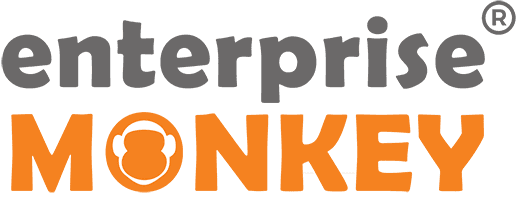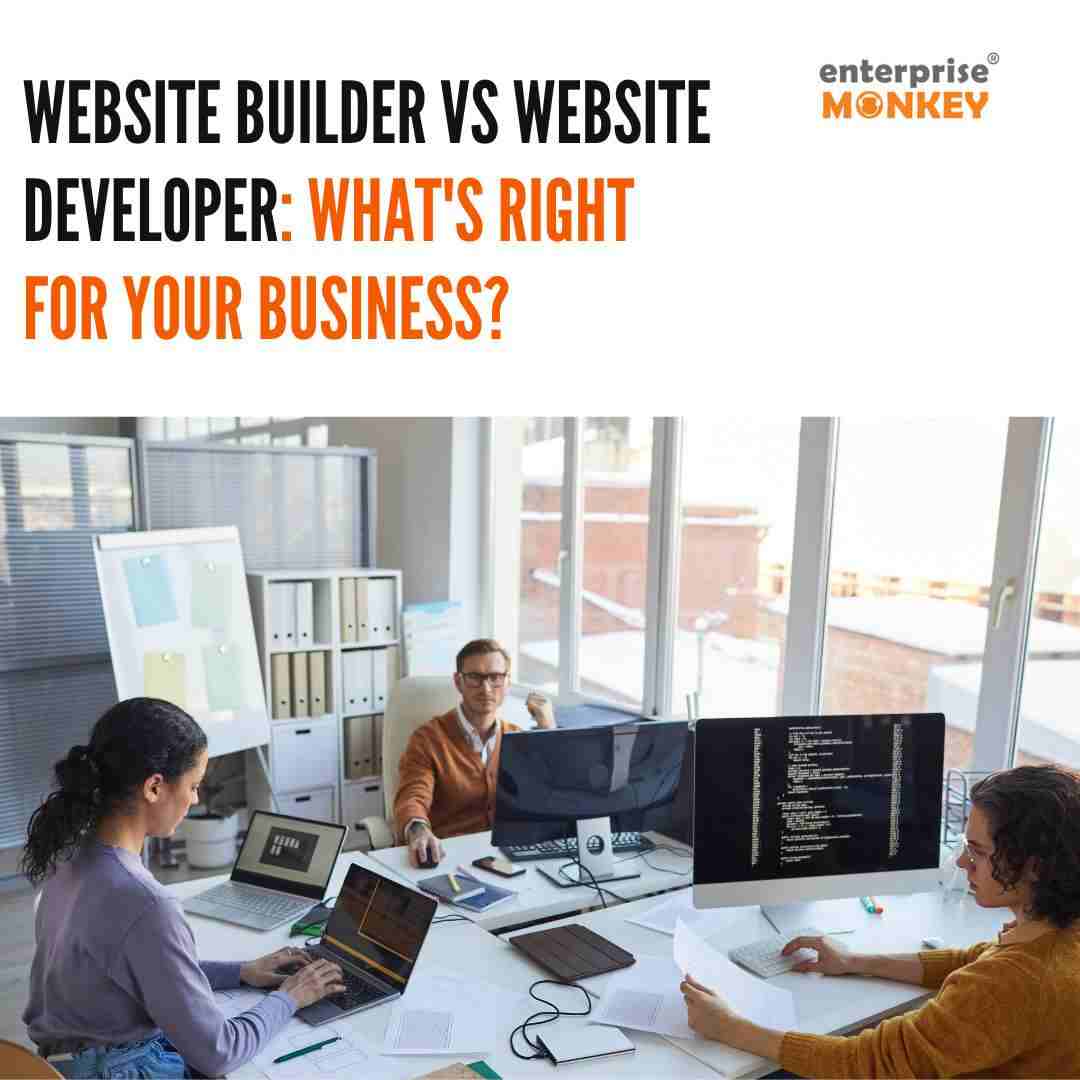Once you know you need a website for your business, the next crucial step is to determine how to create it?
You have mainly two pivotal choices: Website Builder and Website Developer. However, the point to be noted here is your selection can significantly impact your online presence. This means, your decision is directly proportional to the success and functionality of your digital platform.
If you believe that you cannot establish or host your website without experience and coding knowledge, think again! Website builders these days provide a DIY platform where you can create your site without any fancy tech skills.
Nevertheless, a DIY approach is not going to work if your business website requires customisation, complex functionalities, and design expertise. In that case, only a seasoned website developer can help you to perfectly craft your vision into reality.
Thus, to tackle the vital question of choosing between a website builder and enlisting the expertise of a website developer, we have created this comprehensive blog.
Here, we’ll delve into the comparative analysis of these two approaches. We’ll also learn about their respective pros and cons, core differences and factors to consider for making an informed decision.
Therefore, by the end of this blog, you will have a clear understanding of the nuances of each option so as to navigate seamlessly with your website development project.
Website Builder v/s Website Developer: An Overview
One of the first decisions you’ll face when establishing your online presence is whether to use a website builder or hire a developer.
Both options require time, money, and effort, so it is crucial for a business to make the right choice. First, let’s understand these two approaches separately.
Website Builder: The DIY Convenience
Website builders, the Legos of the website world, have become increasingly popular due to their ease of use and affordability. They offer pre-designed templates, drag-and-drop functionality, and a user-friendly interface, allowing you to build a website without any coding knowledge.
Examples of Website Builders:
|
Ideal for:
Website Builder approach is ideal mainly for small businesses and start-ups that usually prioritise:
- Cost Effectiveness
- Speed and Ease of Use
- Limited Technical Expertise
- Simple Websites
Pros and Cons of Website Builder
Here are some key benefits and considerations of using a website builder:

Pros:
- Ease of Use: Website builders are user-friendly and require no coding knowledge. You can simply choose a template, customise it using their drag and drop features with your content and images, and publish your site within hours.
- Cost-Effective: Most website builders offer affordable pricing plans, making them ideal for small businesses and startups with limited budgets.
- Quick Deployment: A website builder allows you to launch your website quickly, establishing an online presence without delays.
Pre-built Templates: Website builders offer a wide range of templates that you can customise to match your brand’s look and feel.
Cons:
- Limited Customisation: While website builders offer customisation options, they may have limitations when it comes to advanced design features and functionalities.
- Lesser Scalability: As your business grows, you may outgrow the capabilities of a website builder, requiring you to upgrade to a more robust solution.
- Limited Technical Support: While most website builders provide customer support, the level of assistance may vary, and you may encounter limitations when seeking advanced technical help.
Website Developers: Customised Solutions
Website developers are the architects of the web. Hiring a website developer or a web development agency offers a more tailored and customised approach to building your website. They are the experienced professionals to create a smart website for your business as per requirements.
Developers have the expertise to create unique and interactive website designs from scratch and implement custom functionalities, catering to your specific needs and vision.
Types of Website Developers:
|
Ideal for:
- The website developer approach is ideal for businesses that prioritise:
- Unique Brand Identity and Functionality
- Scalability and Growth
- Performance and Security
- Customised Design and SEO
- Ongoing Support and Maintenance
Pros and Cons of Website Developer
Here are the benefits and considerations of working with a website developer:

Pros:
- Customisation: A website developer can create a fully customised website tailored to your business needs, branding, and functionality requirements.
- Scalability and Flexibility: Developers can build scalable websites that can grow with your business, integrating advanced features and functionalities as needed.
- Unique Design: With a developer, you can achieve a unique and professional design that sets your website apart from competitors.
- Technical Expertise: Developers have in-depth knowledge of coding languages, frameworks, and best practices, ensuring a high-quality and efficient website.
Cons:
- High Cost: Hiring a website developer or agency can be more expensive upfront compared to using a website builder. However, the investment often pays off in terms of quality and long-term scalability.
- Time-Consuming: Custom website development typically takes more time than using a website builder, as it involves planning, design, development, and testing phases.
- Ongoing Maintenance: After the website is launched, ongoing maintenance and updates may require technical expertise or additional support from the developer.
Difference Between Website Builder and Website Developer
| Aspects | Website Builder | Website Developer |
| Cost | Affordable, often based on subscription plans | Higher upfront cost, custom quotes may vary |
| Customisation | Limited to templates and basic customisation | Fully customisable, tailored to specific needs |
| Design Process | DIY approach with drag-and-drop tools | Collaborative process with professional design |
| Time to Deployment | Quick setup, launch within hours | Longer development time, depending on complexity |
| Scalability | Limited scalability for complex functionalities | Highly scalable, can accommodate future growth |
| Technical Expertise | No coding skills required | Requires coding expertise and technical knowledge |
| Support and Maintenance | Basic support provided by the platform | Ongoing support, maintenance, and updates |
| Security | Standard security measures | Customised security protocols and compliance |
Important Factors to Consider Before Making Your Choice
Several important factors should be considered when deciding between using a website builder or hiring a website developer. Here are the key factors to evaluate before making your decision:

Budget
Consider your budgetary constraints. Website builders are generally more cost-effective upfront, with subscription plans or free options available, making them ideal for businesses on a tight budget or those starting out.
On the other hand, hiring a website developer involves a higher initial investment but offers fully customised solutions, advanced functionalities, long-term scalability, and ongoing support.
You can ask for quotes from different website development service providers and compare the cost of building a website to make an informed decision.
Website Complexity
Assess the level of complexity of your website. Website builders provide pre-designed templates and basic customisation options suitable for simple websites. However, working with a developer is essential if you need unique design elements, advanced functionalities, and tailored solutions.
Design and Branding
Evaluate the importance of professional design and branding consistency. Website builders offer ready-to-use templates that may not fully align with your brand identity. A website developer can create a custom design that reflects your brand’s personality and enhances user experience.
Technical Expertise
Assess your technical expertise or team capabilities. Website builders are designed for users without coding experience, making them accessible to beginners.
However, a developer’s expertise is crucial if you require advanced technical solutions, coding expertise, and optimization for SEO, performance, and security.
Timeline
Determine your timeline for launching the website. Website builders allow for quick deployment, while custom development by a developer may take longer due to the planning, design, development, and testing phases.
The choice between a website builder and a website developer hinges on your business type and its specific needs. Here’s a table to help you decide:
| Choosing Between Builder and Developer as per the Business Type | ||
| Business Type | Website Builder | Website Developer |
| Small Businesses (e.g., Restaurants, Cafes, Salons) | > Ideal choice for simple websites with basic information, menus, and contact forms. > Budget-friendly and easy to manage. | > Ideal choice if your website needs complex online booking systems or extensive customisation. |
| eCommerce Businesses (Starting Out) | > Can be suitable for basic online stores with limited product offerings. > Some builders offer eCommerce functionalities (e.g., shopping carts). | > Ideal for large-scale e-commerce platforms with complex product management or payment gateways. > Extensive design customisation for a unique brand experience. |
| Blogs and Content-Centric Websites | > Perfect for creating and managing blog content. > Many builders offer content management system (CMS) features. | > Extensive design flexibility for a unique brand identity. * Ideal for highly customised user experiences. |
| Businesses with Scalability Needs (e.g., Startups) | > Might be suitable for initial website launch but limited for future growth. | > Crucial choice for building a website that can adapt to increasing traffic and features. |
| Businesses with Complex Functionality Needs (e.g., Booking Platforms) | > Not recommended as builders lack features for complex functionalities. | > Perfect choice as it is essential for building custom features like online booking systems, membership areas, or custom integrations. |
| Businesses Prioritising Brand Identity | > Limited design customisation options restrict brand expression. | > Ideal choice as it ensures a website that perfectly reflects your brand image and sets you apart. |
Remember: Consider your specific business goals, budget, and technical expertise when making your final decision. Access each factor carefully before deciding on the most appropriate approach for creating your business website.
Still Unsure? Consider a Hybrid Approach:
|
Conclusion
Both website builders and website developers have their strengths and limitations.
However, while working with a website development company may involve a higher initial investment than with a website builder, the long-term benefits, customisation options, technical expertise, scalability, and professional support justify the decision for many businesses.
Choosing a reputable and experienced website design and development company can lead to a successful and effective online presence that drives business growth, enhances customer engagement, and establishes a robust digital brand image.













